MXM emerges as new CPU module form factor
Nov 30, 2007 — by Eric Brown — from the LinuxDevices Archive — 32 views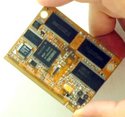 Embedian announced two credit-card sized computer modules that use the MXM (Mobile PCI Express Module) format. The company claims that the MXM-7110 and the graphics-enhanced MXM-7114, both of which run Debian Linux, are the first ARM-based industrial computers to use the MXM format.
Embedian announced two credit-card sized computer modules that use the MXM (Mobile PCI Express Module) format. The company claims that the MXM-7110 and the graphics-enhanced MXM-7114, both of which run Debian Linux, are the first ARM-based industrial computers to use the MXM format.
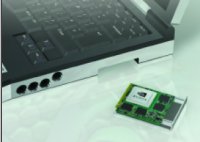 Established in 2004 by nVidia and a number of notebook vendors, MXM is an open, graphics interconnect standard commonly used in laptops. Nvidia created MXM with the goal of making laptop graphics cards more standardized and user-upgradeable.
Established in 2004 by nVidia and a number of notebook vendors, MXM is an open, graphics interconnect standard commonly used in laptops. Nvidia created MXM with the goal of making laptop graphics cards more standardized and user-upgradeable.
However, it now appears that MXM's board edge connector has been pressed into use as a CPU module interconnect, in much the same way that the SODIMM interface standard for laptop memory modules was re-purposed by CPU module vendors like Strategic Test, Toradex, Cogent Computer Systems, Duolabs, Arcom, and others.
Embedian's 2.60 x 1.97-inch MXM-based boards maintain roughly the same dimension as the SODIMM module format, says the company. Instead of SODIMM's 200 pins, however, MXM uses a 242-pin “golden finger” connector. The result, says Embedian, is more design flexibility and expandability.
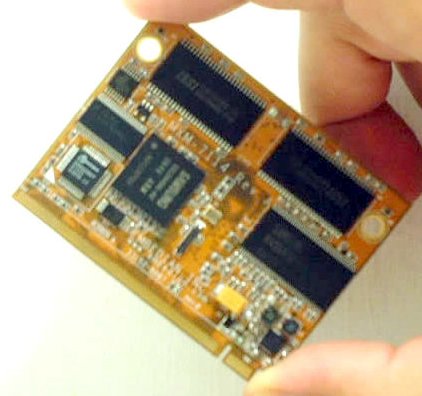
Embedian MXM-7114
The MXM-7114 and MXM-7110 appear to be identical except for the addition to the MXM-7114 of a Silicon Motion SM502 graphic chip. Like Embedian's recently announced COM-7211, both boards use a Samsung S3C2440A built around an ARM920T core running at 400Mhz, says Embedian. Equipped with 64MB SDRAM and 64MB NAND, the boards are said to include a 24-bit (32-bit) TFT LCD interface, two USB host ports, Ethernet, and extensive I/O (see specs below).
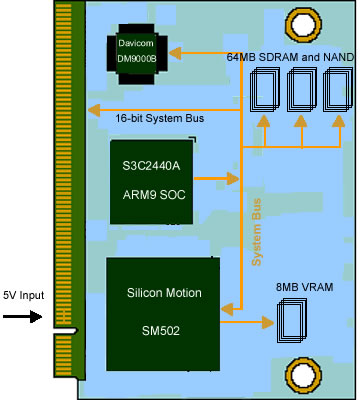
MXM-7114 block diagram
Specifications for the MXM-7114 include:
- Processor — Samsung S3C2440A, 400 MHz
- Memory — 64MB SDRAM (expandable to 128MB); 64MB NAND
- Video — 1280×1024 SM502 graphics; 4-wire analog resistive touchscreen support
- Audio — AC '97 compatible; line-in/out, mic interfaces
- Networking — 10/100 Ethernet
- Other I/O:
- 5 x standard serial ports (three from CPU and two from SM502)
- 2 x SSP (synchronous serial protocol) ports (e.g. for SPI support)
- 12 GPIOs
- 8 external Interrupts
- 2 x USB 1.1 host port with 4 x PWM outputs and I2C interface
- Expansion:
- 3.3V IDE interface or CompactFlash interface
- 16-bit system bus
- Dimensions — 2.60 x 1.97 inches (66mm x 50mm)
- Operating temperature — -5 to +75 degrees C
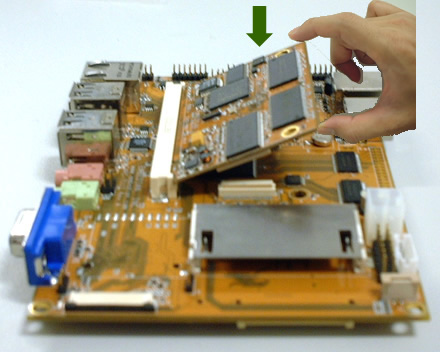
The MXM-7114 module being inserted into the APC-7116 development board by the world's smallest hand
Embedian also offers an APC-7116 development board for the new modules (see photo). Alternatively, customers can “re-spin” the carrier board, designing custom boards to meet their specific I/O needs.
Availability
MXM-7110 and MXM-7114 are available now with Debian Linux or Windows CE 5.0 pre-installed, says Embedian. An evaluation kit is also available for customers. Pricing was not disclosed.
This article was originally published on LinuxDevices.com and has been donated to the open source community by QuinStreet Inc. Please visit LinuxToday.com for up-to-date news and articles about Linux and open source.